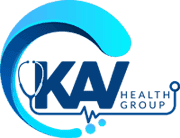
Opioid addiction has affected families across the United States for decades, and Ohio has been among the hardest hit.
From 2010 to 2016, deaths from opioid overdose in Ohio more than tripled, rising from 974 to 3,411. Despite strong statewide efforts to fight this crisis, there is still so much we can do together at the community and individual levels to save lives and support recovery.
At KAV Health Group, we help people overcome opioid addiction with evidence-based care. We are a Suboxone clinic that offers medication-assisted treatment, often called MAT, along with counseling and behavioral therapy. With locations in Dayton, Cincinnati, and Columbus, plus a convenient online telehealth program that serves people across Ohio, we make compassionate, professional help easier to access.
What Are Opioids
Opioids are natural, semi-synthetic, and synthetic substances that act on opioid receptors in the nervous system. This class includes both legal and illegal drugs. Some are prescribed for pain management, and others are obtained on the street. Common examples include heroin, oxycodone, hydrocodone, morphine, codeine, hydromorphone, meperidine, diphenoxylate, propoxyphene, fentanyl, tramadol, and methadone. Brand names you may recognize include OxyContin, Percocet, Vicodin, Kadian, Avinza, Dilaudid, Demerol, Lomotil, Darvon, Duragesic, and Ultram.
Opioids bind to receptors that stimulate dopamine release, which can create strong feelings of euphoria and pain relief. Even when used as prescribed, opioids can be highly addictive. Over time, tolerance can build, and larger doses are needed to feel the same effects. When access to prescription painkillers is lost, some people turn to street opioids such as heroin or illicitly manufactured fentanyl, which significantly increases overdose risk.
Signs Someone May Need Help
-
Using more medication than prescribed or running out early
-
Strong cravings or urges to use
-
Spending significant time obtaining, using, or recovering from opioids
-
Withdrawal symptoms such as nausea, sweating, anxiety, or insomnia when not using
-
Continuing to use despite problems at work, school, or home
-
Loss of interest in activities that used to matter
If these signs feel familiar to you or for someone you love, there is hope. Treatment works, and people do recover.
Why Medication-Assisted Treatment Works
Medication-assisted treatment combines safe, FDA-approved medications with therapy and supportive care.
-
Suboxone contains buprenorphine and naloxone. It reduces cravings and withdrawal so people can stabilize and focus on healing.
-
Counseling and therapy help address the mental, emotional, and environmental factors that contribute to addiction.
-
Whole person support may include case management, relapse prevention planning, and help rebuilding healthy routines and relationships.
This comprehensive approach treats opioid use disorder like the medical condition it is. MAT has been shown to lower overdose risk, reduce illicit opioid use, and improve retention in treatment.
How KAV Health Group Helps
KAV Health Group offers an integrated care model designed around accessibility and dignity.
-
Evidence-based treatment that blends Suboxone based MAT with counseling
-
Flexible access through clinics in Dayton, Cincinnati, and Columbus
-
Telehealth for all of Ohio, so you can start and continue care from home
-
Compassionate providers who focus on safety, privacy, and lasting recovery
Whether you are taking your first step or returning to care, we will meet you where you are and tailor a plan that fits your life.
What To Expect When You Reach Out
-
Confidential conversation to discuss your history, goals, and any immediate concerns
-
Personalized treatment plan that may include Suboxone, therapy, and supportive services
-
Ongoing follow-up to monitor progress, adjust medications if needed, and strengthen coping skills
Safety Tips and Immediate Steps
-
Carry naloxone if you or a loved one is at risk of overdose. Naloxone can reverse an opioid overdose and is widely available in Ohio without a prescription.
-
Avoid using alone and consider test strips to check for fentanyl when harm reduction resources are available.
-
Know the signs of overdose, such as very slow or stopped breathing, blue lips or fingertips, and unresponsiveness. Call 911 right away.
These steps do not replace treatment, but they can save lives while you or a loved one gets help.
Take the Next Step
If you or someone you care about is struggling with opioid addiction, KAV Health Group is here to help. With proven medication-assisted treatment, skilled counseling, and convenient in-person and telehealth options, we make it possible to start recovery today.
You are not alone. Reach out to schedule a confidential appointment and learn how we can support your path forward.

